Our Peer Support Model
Peer Support has been an integral part of Together since 2012. Over the years, we have consistently worked alongside people with lived experience of mental distress to shape the Together Peer Support Model. This ensures that what we deliver reflects the wants and needs of people experiencing mental distress and the people using our services.

Peer support at Together is a leading example of our core ethos of service user leadership – our model and principles empower people using our services, and those with lived experience of mental distress, to feel valued and have choice and control in their care and support.
At Together peer support means…
People with experience of mental distress support each other towards better wellbeing as people of equal value and on a reciprocal basis, using their own lived experience as a tool for support.
Our unique peer support model also supports Together services to have the infrastructure that enables authentic peer support to flourish, whilst ensuring that lived experience of mental distress leads the way.
The Together Model and Principles of Peer Support are as follows:
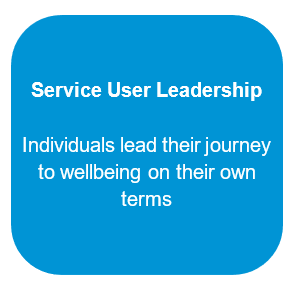 |
|
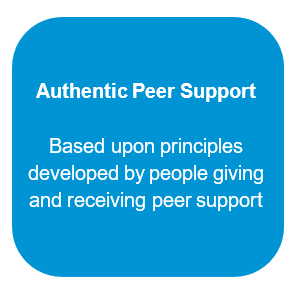 |
|
Originally developed in 2012, and reviewed in 2022 by those involved in peer support at Together, these principles set out those elements that are essential within all forms of peer support and peer relationships. The principles enable peer support to be defined and to clearly differentiate it from other forms of support.
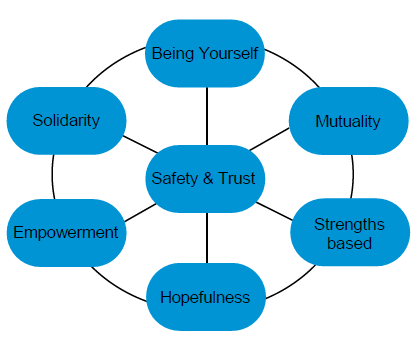
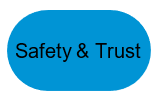 A peer is a person of equal standing and peer relationships are built from the foundations of having choice and control around how and when a person uses peer support and having appropriate and agreed boundaries in place.
A peer is a person of equal standing and peer relationships are built from the foundations of having choice and control around how and when a person uses peer support and having appropriate and agreed boundaries in place.
 Building meaningful connections through embracing our uniqueness and exploring what supports our wellbeing and development. Appreciating diversity and valuing different ways of understanding and interpreting our personal experiences.
Building meaningful connections through embracing our uniqueness and exploring what supports our wellbeing and development. Appreciating diversity and valuing different ways of understanding and interpreting our personal experiences.
 A relationship that is based upon shared experiences which could be similar experiences of mental distress or a shared identity or background, which remind us that we are not alone in our experiences and can come together to support each other in community.
A relationship that is based upon shared experiences which could be similar experiences of mental distress or a shared identity or background, which remind us that we are not alone in our experiences and can come together to support each other in community.
 Peer support is based upon both people benefitting from the peer relationship, it is reciprocal and each person is both giving and receiving support. Everyone’s expertise is valued, learning from and with each other through the sharing of experiences and ideas.
Peer support is based upon both people benefitting from the peer relationship, it is reciprocal and each person is both giving and receiving support. Everyone’s expertise is valued, learning from and with each other through the sharing of experiences and ideas.
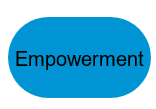 Peer support is non-directive, it’s about making personal choices, trying new things and working towards self-defined goals that are personally meaningful. Defining our experiences for ourselves and drawing on our strengths both individually and collectively.
Peer support is non-directive, it’s about making personal choices, trying new things and working towards self-defined goals that are personally meaningful. Defining our experiences for ourselves and drawing on our strengths both individually and collectively.
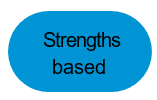 Reconnecting with or discovering our skills, abilities and resources to problem solve challenges and find our own solutions. Peer support focuses on individual strengths, talents, expertise, experience and potential to live personally meaningful and satisfying lives.
Reconnecting with or discovering our skills, abilities and resources to problem solve challenges and find our own solutions. Peer support focuses on individual strengths, talents, expertise, experience and potential to live personally meaningful and satisfying lives.
 Those providing peer support embody hopefulness and are evidence that things can change. Hearing others experiences can be inspiring and promote hope and optimism along with the chance to have insight into and learn and grow from challenges and setbacks.
Those providing peer support embody hopefulness and are evidence that things can change. Hearing others experiences can be inspiring and promote hope and optimism along with the chance to have insight into and learn and grow from challenges and setbacks.
The History of Peer Support
The model and principles also come from a place of respecting and being informed by the roots and the history of peer support which lie in the 1970’s survivor movement. The movement focused on improving mental health systems, making these better for others through social justice campaigning that was in favour of approaches run by, and for, people with experience mental distress. This created a sense of survivorship, solidarity, and empowerment within the movement due to people feeling heard, understood, and being provided with an opportunity to define personal narratives around their experiences.
Benefits of Peer Support
At Together, we continuously emphasise the numerous benefits that peer support can bring to both individuals. Peer support is therefore a fantastic example of a mutually beneficial relationship, whereby both individuals can benefit from the relationship in terms of the insights, knowledge, and skills that both individuals are able to bring through drawing on their own personal experiences.
Many people value the freedom of choosing how to describe their experiences using explanations and frameworks that are personally meaningful to them, and this is reflected in the ethos of peer support and the nature of reciprocal relationships whereby each person is the expert on themselves whilst learning together. The diagram below shows some of the benefits of peer support:

‘’I feel less isolated and have a greater sense of purpose’’
‘’My peer support relationships have given me inspiration’’
‘’For the first time, I felt that someone truly understood’’
‘’I have re-learnt to trust my own judgement again’’
‘’Turning a negative experience into a positive one for the benefit of myself and another person’’
‘’Being able to use my experience openly to support others’’
‘’Being inspired by another person’s journey’’
‘’Within trying times, I know I’m not alone’’


